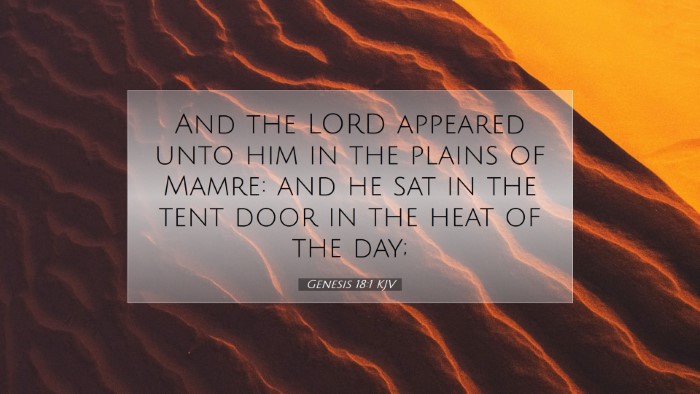Commentary on Genesis 18:1
Genesis 18:1 is a profound verse that opens a significant narrative in the life of Abraham,
highlighting the theme of divine visitation and hospitality. This verse reads:
"And the Lord appeared unto him in the plains of Mamre: and he sat in the tent door in the heat of the day."
In this commentary, we will explore the insights from notable public domain commentators,
including Matthew Henry, Albert Barnes, and Adam Clarke, to provide a rich analysis of
this pivotal scripture.
Contextual Overview
The context of Genesis 18 is essential for understanding the significance of the events
leading up to Abraham's encounter with God. This event occurs in the broader narrative of
God's covenant with Abraham and the promise of a son, Isaac. Not only does God reveal His
plans to Abraham in this chapter, but it also showcases Abraham's faith and hospitality.
Genesis 18 marks a transition in Abraham's journey, as it is here that God affirmatively
reiterates His promises and discusses the fate of Sodom and Gomorrah with Abraham.
Understanding the historical and theological implications of this setting is essential when
reflecting on Genesis 18:1.
Divine Visitations
Matthew Henry emphasizes the importance of divine visitation, noting that God's appearance
to Abraham was both a gracious act and a moment of revelation.
"The Lord appeared unto him," writes Henry, "to make his covenant with him, to inform him of what he was to do..."
This divine appearance underscores the relationship between God and Abraham, showing that
God is not distant but engages personally with His chosen individuals.
Albert Barnes complements this thought by highlighting how God's visitations often come
at significant times. He states, "This was a special manifestation of God's presence."
The appearance at Mamre signifies not just a casual encounter but a purposeful visitation
with immediate implications for Abraham and God's unfolding plan.
The Symbolism of Mamre
Mamre, the location where this encounter occurs, is rich in symbolism. Adam Clarke notes
the area as a place of both rest and revelation. He articulates the significance of the term
"Mamre," which is associated with "strength" or "vigor." This implies
that divine communication often happens in places of strategic importance—a theme seen
throughout Scripture.
In a pastoral context, the location of divine revelation reminds us to be attentive to our
surroundings as we seek God's guidance. It suggests that God can manifest His presence
during ordinary activities and in familiar places, illustrating His desire for relationship
rather than formality.
Abraham's Attentiveness
The verse notes that Abraham sat in the tent door in the heat of the day.
This detail is significant. Matthew Henry interprets Abraham's posture as one of
observance and readiness. He underscores that such attentiveness to
God's movements reflects a heart prepared for divine interaction.
Abel Barnes adds that the "heat of the day" represents a time of inactivity and rest,
where one might expect less activity. This juxtaposition serves to illustrate the idea that
God often meets individuals in their most mundane moments, providing a powerful reminder that
believers should remain watchful and expectant, even in everyday life.
Hospitality: A Divine Principle
Following the appearance of God, the narrative elaborates on Abraham's hospitality as he
welcomes the angelic visitors. This principle of hospitality is profoundly biblical and often
overlooked. Matthew Henry makes an insightful remark that highlights how
"Abraham, by his hospitality, engaged the presence of God."
His eagerness to serve the needs of others reflects a heart aligned with divine values.
Albert Barnes points out that hospitality extends beyond mere physical offerings; it is
a manifestation of love and service that opens the door for divine encounters.
"He that receives a prophet in the name of a prophet shall receive a prophet's reward,"
states Barnes, tying Abraham’s actions to a broader biblical principle that remains
relevant for believers today.
The Theology of Presence
The appearance of the Lord to Abraham speaks volumes to the theology of God's presence
throughout Scripture. Adam Clarke notes that God's visits are not just for guidance but
to deepen His covenant relationship with His people.
Theologically, this encounter emphasizes God's initiative and willingness to engage
with humanity. It underscores the importance of understanding God’s nature—He is not
merely a far-off deity but a God who desires close fellowship with His followers.
This interpretation invites believers, particularly pastors and theologians, to reflect on the
significance of God's presence in their own lives and ministries. It provokes a profound
inquiry: how are we engaging with the divine presence in our daily experiences?
Conclusion
In reviewing Genesis 18:1 through the lenses of various public domain commentaries, we see
a continuous thread of insight concerning divine visitation, faithful attentiveness, and
the importance of hospitality.
For modern pastors, students, and theologians, this verse serves as a reminder of the
relational nature of God; it challenges us to embody characteristics that welcome His presence
as we interact with one another and engage in our spiritual journey.
Genesis 18:1 thus encapsulates critical themes of faith, the nature of God’s communication,
and the posture of a believer who longs to see God at work in their life.


